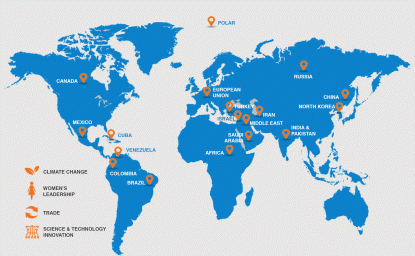Brazil expects:
- Continued U.S. support for ongoing efforts in Brazil to address corruption, deepen the rule of law, and overcome current economic troubles.
- U.S. and Brazilian interests to converge in important economic sectors, such as aviation, agriculture, energy and education.
- The United States and Brazil to collaborate on trade policy.
Q: What is the greatest challenge facing the United States’ relationship with Brazil?
A: The greatest challenge the United States faces with Brazil, and vice versa, is to add substance and real purpose to a relationship that has been generally good but superficial in recent times. As the largest economies and democracies in the Americas, the United States and Brazil have converging political and economic interests. The impact of the ongoing collapse of the Bolivarian regime in Venezuela is a case in point. The successful resolution of this long brewing crisis is in Washington and Brasilia’s interests to ensure regional stability, and should be pursued in close consultation with neighboring democracies. Brazilian and U.S. interests converge also in important economic sectors, such as aviation, agriculture, energy and education. The challenge for the next U.S. administration is to translate these interests into opportunities for strategic engagement that can lead to outcomes that benefit both nations.
Q: What will the next president need to do to manage these obstacles and/or expectations?
A: The recent U.S. political campaign highlighted a number of the domestic challenges that the United States currently faces. Brazil is not part of these difficulties but it could be part of the solution, particularly if both governments and business communities engage in a results-oriented dialogue. Embraer, the world’s largest builder of airplanes, offers a good example. It generates thousands of direct and indirect jobs in the industrial and service sectors in the United States. The United States is the country of origin for at least 50 percent of the components on each Embraer airplane, and the destination for three-quarters of the executive and regional jets the company produces. American companies such as Boeing and Lockheed Martin have already explored areas of collaboration with Embraer on defense and logistics. Infrastructure building is another area that offers potential attractive opportunities for the participation of U.S. companies in the Brazilian market, and vice-versa.
Q: Can Brazil and the US collaborate on trade policy?
A: There is also potential for dialogue on trade, particularly given the recent tenor of the U.S. debate. Brazil is perhaps the most closed middle-income economy in the world today. The negative consequences of protectionism and economic isolation, exacerbated in recent years, are very much in evidence as the country looks for ways to overcome the largely self-imposed crisis that has resulted in the longest recession in Brazilian history and cost more than 12 million jobs. Overcoming this inward tradition of Brazilian development and increasing the country’s competitiveness and productivity are seen as key to the nation’s future. Against this backdrop, Brazil’s entrenched skepticism vis-à-vis trade liberalization proposals such as the Trans Pacific Partnership offers space for dialogue between Brasilia and Washington on trade expansion that harnesses the benefits of a more open economy in a globalized system while avoiding its pitfalls. That conversation should be pursued in the context of greater people to people exchanges in the areas of business, education, and scientific research and development.
Lastly, U.S. support for ongoing efforts in Brazil to address corruption, deepen the rule of law, and overcome current economic troubles is imperative not only for Brazilian businesses and workers, but is also in the best interests of the United States. A stable and growing Brazil would exert a positive influence in South America and beyond. The next administration should seek to maintain the constructive attitude Washington has had towards Brazil in recent Republican and Democratic administrations.
Guest


Brazil Institute
The Brazil Institute—the only country-specific policy institution focused on Brazil in Washington—aims to deepen understanding of Brazil’s complex landscape and strengthen relations between Brazilian and US institutions across all sectors. Read more

Explore More
Browse Insights & Analysis
What Does the World Expect of President-elect Trump?

Promoting Convergence in US-Brazil Relations

360° View of How Southeast Asia Can Attract More FDI in Chips and AI
